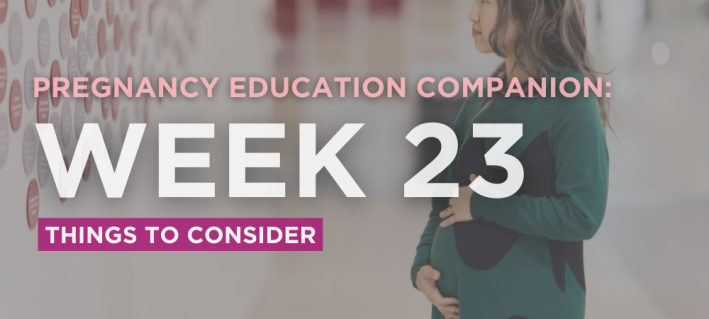
You must be around 23 weeks pregnant!
By now, you’ve probably had your Booking-In appointment at the hospital.
This week, we’re discussing topics you should consider both now and throughout your pregnancy.
Part 1: Emotional changes
During pregnancy, your body and emotions can change a lot. Hormones, tiredness, nausea, and feeling unwell can all affect how you feel. Pay attention to how you’re feeling and ask for support if you need it.

It’s common to feel emotional highs and lows when you’re pregnant. You may feel sad or teary without knowing why. These feelings can come and go and last for different lengths of time. But if you’re feeling sad most of the time or you’re having a lot of negative thoughts, you could be developing depression.
If you have a partner, they may also go through emotional changes and need support.
Signs of depression can include feeling:
- guilty
- irritable
- hopeless
- low, anxious, or tense a lot of the time.
You may also experience:
- loss of interest in things you normally enjoy
- frequent crying
- problems sleeping, concentrating, or making decisions
- thoughts of hurting yourself or others. Please seek immediate support or call Triple zero (000).
Talk honestly and openly about your feelings and symptoms with your midwife or doctor. They’ll help you find the best support options available to you.
If you need help dealing with your emotions or feelings, your healthcare provider can refer you to our Women’s Mental Health Service.
You can also find helpful information about pregnancy and mental health on the Beyond Blue website.

Partners may also be feeling a range of emotions. It’s important to keep talking with each other about your feelings. This can help you both adjust to the changes happening in your lives. If you need support, contact Beyond Blue or Relationships Australia.


When you’re pregnant and single, it’s important to have people you can trust and talk to.
Build a support network of family or close friends who can care for you and give you emotional support during your pregnancy. They’ll be there for you during tough times and share in your joy and excitement.
They can also help you with personal, medical, or financial challenges that may come up.
If you feel overwhelmed, a counsellor or other health professional can provide more support. You can also ask for a referral to our Social Work Department if you need it.
Things to consider
- Ask a trusted friend or family member to go with you to appointments and childbirth classes.
- Identify people who can support you after your baby is born.
- Plan for childcare if you intend to go back to work.
- Find out if you’re eligible for any parenting benefits.
- Discover local community services that can help you and your baby. Talk to your local council and Maternal and Child Health Nurse for more information.

- PANDA
Antenatal depression: signs and symptoms
Emotional and mental wellbeing for LGBTIQA+ parents
Support for new parents
Support for dads
National Helpline: 1300 726 306
- Cope (Centre of Perinatal Excellence)
Antenatal depression (This Information is available in English and other languages)
Part 2: Workload around the home during pregnancy
 At the Women’s, we recognise and value the diversity of all people, regardless of their gender identity. Everyone deserves a safe, welcoming, respectful, and inclusive environment.
At the Women’s, we recognise and value the diversity of all people, regardless of their gender identity. Everyone deserves a safe, welcoming, respectful, and inclusive environment.
Pregnancy can be a great time to discuss and challenge traditional ideas about gender roles in parenting.
It’s helpful to talk about any issues as they arise. This open communication can reduce stress, prevent relationship strain, and limit the risk of violence.
Here are some topics to discuss that can help support your conversations, depending on your relationships, support system, and family structure:
- Who do you have to support you? (partner, family, friends)
- Who will be the main, stay-at-home caregiver?
- How will the other person or people support this role?
- How long will parental leave be taken?
- How will this impact family finances?
- How have physical and emotional changes affected the home environment?
- How can you plan to manage these changes?
- Who else can provide support during this time?
Research shows that how household tasks and parenting duties are shared in the first year after a child is born tends to remain the same for at least the next 10 years. This can sometimes cause feelings of resentment, guilt, and stress, which can add to the challenges of being a new parent.
It’s important to recognise that the workload in your new family may not always be evenly shared. There may be times when one person has more responsibilities, such as caring for the new baby, dealing with illness, or increased work demands. What matters most is how you support each other during these times.
For more information
- Better Health Channel
Pregnancy support – fathers, partners, and carers
Part 3: Violence should not be part of your pregnancy
Healthy relationships are built on respect and safety. No one should ever make you feel unsafe or abuse you. If you’re experiencing verbal, emotional, sexual, financial, spiritual, or physical violence, talk to a health professional for support.
Violence can have an enormous impact on you, your pregnancy, your baby’s health, and the wellbeing of other children. Sometimes, violence may start during pregnancy and become worse after your baby is born.
You can get confidential advice and support from your health professional, a social worker, and the Women’s at any time during your pregnancy.
For additional support if you’re worried about unhealthy, abusive, or violent behaviour in your relationship, you can also contact these organisations:
- Police – Call Triple zero (000)
- Safe Steps Family Violence Response Centre
1800 015 188 (24 hours, 7 days a week) You can call any time day or night. - The Royal Women’s Hospital
The Women’s provides support to people who’ve experienced sexual assault. You can call any time, day or night.- Monday to Friday between 9am and 5pm
Centre Against Sexual Assault (CASA House)
(03) 9635 3610 > - For after-hours support, including weekends and public holidays
Sexual Assault Crisis Line
1800 806 292
- Monday to Friday between 9am and 5pm
- Inner Melbourne Community Legal
Free legal services for patients at the Women’s.
To make an appointment call (03) 9013 0495. - 1800RESPECT National Sexual Assault and Family Violence Crisis Service
1800 737 732
You can call any time, day or night. - Djirra - Culturally safe support for Aboriginal people
1800 105 303
You can call Monday to Friday between 9am and 5pm - inTouch – Multicultural Centre Against Violence
1800 755 988
You can call Monday to Friday between 9am and 5pm
We hope you have found this information helpful.
Remember you can go back to previous weeks.
If you have any health concerns, please talk to one of your health care professionals – midwife, General Practitioner (GP), hospital doctor, etc.
There will be more to read and learn next week, in week 24. Stay safe and well.